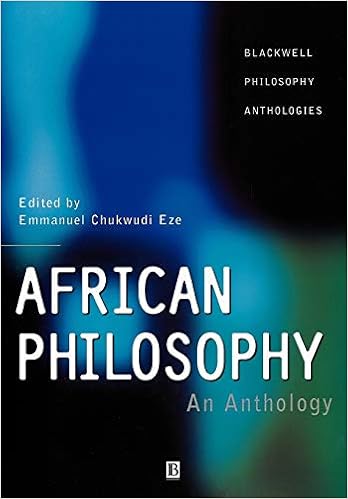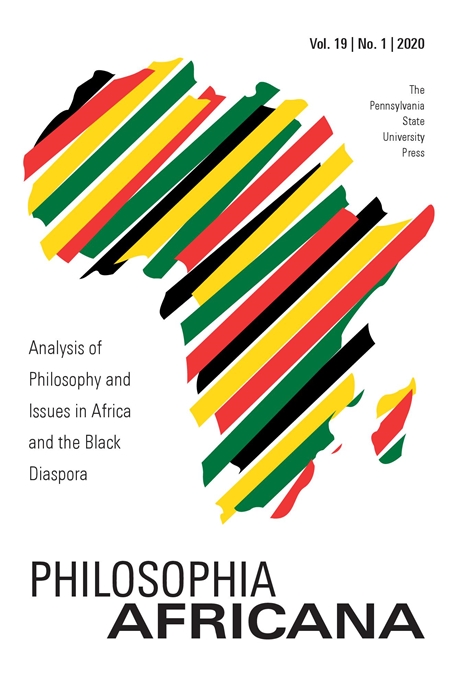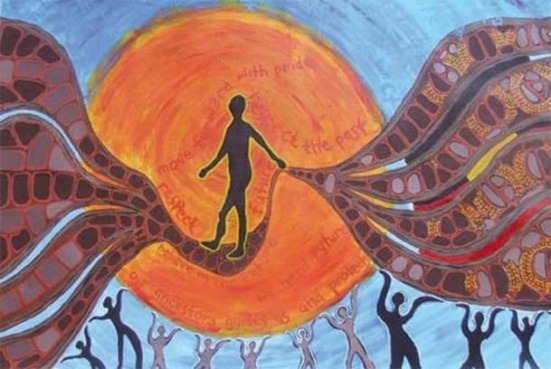
Origins and History of African Philosophy
In Plato’s Theaetetus, Socrates suggests that philosophy begins with wonder. Aristotle agreed. However, recent research shows that wonder may have different subsets. If that is the case, which specific subset of wonder inspired the beginning of the systematic African philosophy? In the history of Western philosophy, there is the one called thaumazein interpreted as awe and the other called miraculum interpreted as curiosity. History shows that these two subsets manifest in the African place as well, even during the pre-systematic era.

However, there is now an idea appearing in recent African philosophy literature called onuma interpreted as frustration which is regarded as the subset of wonder that jump started the systematic African philosophy. In the 1920s, a host of Africans who went to study in the West were just returning. They had experienced terrible racism and discrimination while in the West. They were referred to as descendants of slaves; as people from the slave colony, as sub-humans, and so on. On return to their native lands, they met the same maltreatment by the colonial officials. ‘Frustrated’ by colonialism and racialism as well as the legacies of slavery, they were jolted onto the path of philosophy—African philosophy—by what can be called onuma. These ugly episodes of slavery, colonialism and racialism not only shaped the world’s perception of Africa; they also instigated a form of intellectual revolt from the African intelligentsias. The frustration with the colonial order eventually led to angry questions and reactions out of which African philosophy emerged, first in the form of nationalisms and thenin the form ideological theorizations. But the frustration was borne out of colonial caricature of Africa as culturally naïve, intellectually docile and rationally inept. This caricature was created by European scholars such as Kant, Hegel and, much later, Levy-Bruhl to name just a few. It was the reaction to this caricature that led some African scholars returning from the West into the type of philosophizing one may describe as systematic beginning with the identity of the African people, their place in history, and their contributions to civilization. To dethrone the colonially-built episteme became a ready attraction for African scholars’ vexed frustrations. Thus began the history of systematic African philosophy with the likes of Aime Cisaire, Leopold Senghor, Kwame Nkrumah, Julius Nyerere, William Abraham, John Mbiti and expatriates such as Placid Tempels, Janheinz Jahn and George James, to name a few.
1. Chimakonam, J. O., (n.d.). History of African Philosophy. Internet encyclopedia of philosophy. Retrieved from https://iep.utm.edu/history-of-african-philosophy/#H2
Introductory and In-Depth Material
-
An Introduction to African Philosophy by
Call Number: B5305.I43 1998ISBN: 0847688402Publication Date: 1998"Organized topically rather than historically, this book provides an excellent introduction to the subject of African Philosophy. Samuel Oluoch Imbo synthesizes the ideas of key African philosophers into an accessible narrative. The author focuses on five central questions: What are the definitions of African philosophy? Is ethno-philosophy really philosophy? What are the dangers of an African philosophy that claims to be 'unique'? Can African philosophy be done in foreign languages such as English and French? Are there useful ways to make connections between African philosophy, African American philosophy, and women's studies? By making cross-disciplinary and transnational connections, Imbo stakes out an important place for African philosophy. Imbo's book is an invaluable introduction to this dynamic and growing area of study." --From publisher -
 African Philosophy
by
Call Number: B5305.A36 1998ISBN: 0631203370Publication Date: 1998"Bringing together canonical philosophical texts from African, African-American, Afro-Caribbean, and Black European thinkers, this major new anthology is designed to serve both as a textbook and as the authoritative reference volume in Africana philosophical and cultural studies." --From Publisher
African Philosophy
by
Call Number: B5305.A36 1998ISBN: 0631203370Publication Date: 1998"Bringing together canonical philosophical texts from African, African-American, Afro-Caribbean, and Black European thinkers, this major new anthology is designed to serve both as a textbook and as the authoritative reference volume in Africana philosophical and cultural studies." --From Publisher -
A Companion to African Philosophy by
Call Number: Online Resource (Wiley Online Library Books Online)ISBN: 047099715XPublication Date: 2007"This volume of newly commissioned essays provides comprehensive coverage of African philosophy, ranging across disciplines and throughout the ages. Offers a distinctive historical treatment of African philosophy. Covers all the main branches of philosophy as addressed in the African tradition. Includes accounts of pre-colonial African philosophy and contemporary political thought." --From publisher -
African Philosophy in Search of Identity by
Call Number: I-SHAREISBN: 0748604960Publication Date: 1994"A Kenyan philosopher surveys themes and debates in African philosophy over the last five decades. Masolo’s purview includes Francophone and Anglophone philosophers in both the analytic and phenomenological traditions.” --From publisher -
Sage Philosophy: Indigenous Thinkers and Modern Debate on African Philosophy by
Call Number: I-SHARERISBN: 9004092838Publication Date: 1990"Sage Philosophy is an anthology of three main parts: Part one contains papers by Odera Oruka clearing the way and arguing about his research over the last decade on indigenous sages in Kenya. Part Two introduces verbatim interviews with a given number of those sages, while Part Three consists of published papers by scholars who are critics or commentators on the Oruka project. The author has spent the last decade in Kenya carrying out his research. It is the general stand of the book that the sages turn out to be thinkers or philosophers in no trivial sense, despite their lack of modern formal education.
This study is a critique for all those scholars who hitherto have found no practice of critical philosophy in traditional Africa.” --From publisher -
 Metaphysics : The Kpịm of Philosophy
by
Call Number: I-SHAREPublication Date: 1995"In his work Metaphysics: The Kpim of Philosophy, Pantaleon dedicated the 24thchapter to the development of his uwa ontology, which is a synthesis of his perception of reality. For him, ―Uwa defines being. It summarizes being and beings for me-it englobes all beings in the bossom of Uwa-being-... Whatever is, in so far as it is, is Uwa. Uwa is reality and reality is Uwa‖ (p. 338). To deepen his search, he studied the meaning of Uwa. Translated from the Igbo to the English, it simply means world, however, Pantaleon took advantage of the richness of the Igbo meaning and defined it thus, "The entirety of existence, from God the highest being to inanimate beings of our cosmos, can be summarized in the englobing concept of the Igbo term Uwa. Uwais all inclusive. It mirrors being, existence, entity, all reality. It englobes all that is animate and inanimate, visible and invisible. It is comprehensive, universal and global. It is transcendent and immanent scope as well as explicative and prospective elasticity (p. 339)." --From Ikechukwu Anthony Kanu's review
Metaphysics : The Kpịm of Philosophy
by
Call Number: I-SHAREPublication Date: 1995"In his work Metaphysics: The Kpim of Philosophy, Pantaleon dedicated the 24thchapter to the development of his uwa ontology, which is a synthesis of his perception of reality. For him, ―Uwa defines being. It summarizes being and beings for me-it englobes all beings in the bossom of Uwa-being-... Whatever is, in so far as it is, is Uwa. Uwa is reality and reality is Uwa‖ (p. 338). To deepen his search, he studied the meaning of Uwa. Translated from the Igbo to the English, it simply means world, however, Pantaleon took advantage of the richness of the Igbo meaning and defined it thus, "The entirety of existence, from God the highest being to inanimate beings of our cosmos, can be summarized in the englobing concept of the Igbo term Uwa. Uwais all inclusive. It mirrors being, existence, entity, all reality. It englobes all that is animate and inanimate, visible and invisible. It is comprehensive, universal and global. It is transcendent and immanent scope as well as explicative and prospective elasticity (p. 339)." --From Ikechukwu Anthony Kanu's review -
Knowledge, Belief, and Witchcraft: Analytic Experiments in African Philosophy by
Call Number: 96053559 (I-SHARE)ISBN: 9780804728225Publication Date: 1997First published in 1986, Knowledge, Belief, and Witchcraft remains the only analysis of indigenous discourse about an African belief system undertaken from within the framework of Anglo-American analytical philosophy. Taking as its point of departure W. V. O. Quine's thesis about the indeterminacy of translation, the book investigates questions of Yoruba epistemology and of how knowledge is conceived in an oral culture.
-
"African Philosophy as a Radical Critique" by Alena Rettová"Both components of the name, 'African' and 'philosophy', have been questioned innumerable times with respect to their content and relevance, as has the singular form of this term, in view of Africa's multiple traditions of thought. The present volume makes a contribution to this debate as it strives to map these rich intellectual traditions and question the limits and boundaries of African philosophy established in the existing literature."
Rettová, Alena. “African Philosophy as a Radical Critique.” Journal of African Cultural Studies, vol. 28, no. 2, June 2016, pp. 127–131. -
Philosophia Africana (journal)
 Presents analysis of philosophy and issues in Africa and the Black Diaspora.
Presents analysis of philosophy and issues in Africa and the Black Diaspora. -
Journal of African Cultural StudiesFocuses on dimensions of African culture including literature, performance, art, music, the role of the media, & the relationship between culture & power.
Historical Information
African philosophy as a systematic study has a very short history. This history is also a very dense one, since actors sought to do in a few decades what would have been better done in many centuries. As a result, they also did in later years what ought to have been done earlier and vice versa, thus making the early and the middle epochs overlap considerably. The reason for this overtime endeavor is not far-fetched. Soon after colonialism, actors realized that Africa had been sucked into the global matrix unprepared. During colonial times, the identity of the African was European, his thought system, standard and even his perception of reality were structured by the colonial shadow which stood towering behind him. It was easy for the African to position himself within these Western cultural appurtenances even though they had no real-time connection with his being.
The vanity of this presupposition and the emptiness of colonial assurances manifested soon after the towering colonial shadow vanished. Now, in the global matrix, it became shameful for the African to continue to identify himself within the European colonialist milieu. For one, he had just rejected colonialism and for another, the deposed European colonialist made it clear that the identity of the African was no longer covered and insured by the European medium. So, actors realized suddenly that they had been disillusioned and had suffered severe self-deceit under colonial temper. The question which trailed every African was, “Who are you?” Of course, the answers from European perspective were savage, primitive, less than human, etc. It was the urgent, sudden need to contradict these European positions that led some post-colonial Africans in search of African identity. So, to discover or rediscover African identity in order to initiate a non-colonial or original history for Africa in the global matrix and start a course of viable economic, political and social progress that is entirely African became one of the focal points of African philosophy.
Placid Tempels, the European missionary, elected to help and in his controversial book, Bantu Philosophy, sought to create Africa’s own philosophy as proof that Africa has its own peculiar identity and thought system. However, it was George James, another concerned European who attempted a much more ambitious project in his work, Stolen Legacy. In this work, there were strong suggestions not only that Africa has philosophy but that the so-called Western philosophy, the very bastion of European identity, was stolen from Africa. This claim was intended to make the proud European colonialists feel indebted to the humiliated Africans, but it was unsuccessful. That Greek philosophy had roots in Egypt does not imply, as some Europeans claim, that Egyptians were dark nor that dark complexioned Africans had philosophy. The use of the term “Africans” in this work is in keeping with George James’ demarcation which precludes the light complexioned people of North Africa and refers to the dark complexioned people of southern Sahara.

After these two Europeans, Africans began to attain maturation. Aime Cesaire, John Mbiti, Odera Oruka, Julius Nyerere, Leopold Senghor, Nnamdi Azikiwe, Kwame Nkrumah, Obafemi Awolowo, Alexis Kegame, Uzodinma Nwala, Emmanuel Edeh, Innocent Onyewuenyi, and Henry Olela, to name just a few, opened the doors of ideas. A few of the works produced sought to prove and establish the philosophical basis of African, unique identity in the history of humankind, while others sought to chart a course of Africa’s true identity through unique political and economic ideologies. It can be stated that much of these endeavors fall under the early period.
For its concerns, the middle period of African philosophy is characterized by the great debate. Those who seek to clarify and justify the position held in the early epoch and those who seek to criticize and deny the viability of such position entangled themselves in a great debate. Some of the actors on this front include, C. S. Momoh, Robin Horton, Henri Maurier, Lacinay Keita, Peter Bodunrin, Kwasi Wiredu, Kwame Gyekye, Richard Wright, Barry Halen, Joseph Omoregbe, C. B. Okolo, Theophilus Okere, Paulin Hountondji, Gordon Hunnings, Odera Oruka and Sophie Oluwole to name a few.

The preceding epoch eventually gave way to the later period which has as its focus the construction of an African episteme. Two camps rivaled each other namely; the Critical Reconstructionists who are the evolved Universalists/Deconstructionists and the Eclectics who are the evolved Traditionalists/Excavators. The former seek to build an African episteme untainted by ethnophilosophy; whereas, the latter seek to do the same by a delicate fusion of relevant ideals of the two camps. In the end, Critical Reconstructionism ran into a brick wall when it became clear that whatever it produced cannot truly be called African philosophy if it is all Western without African marks. The mere claim that it would be African philosophy simply because it was produced by Africans (Hountondji 1996 and Oruka 1975) would collapse like a house of cards under any argument. For this great failure, the influence of Critical Reconstructionism in the later period whittled down and it was latter absorbed by its rival—Eclecticism.
The works of the Eclectics heralded the emergence of the New Era in African philosophy. The focus becomes the Conversational philosophizing, in which the production of philosophically rigorous and original African episteme better than what the Eclectics produced occupied the center stage.
The sum of what historians of African philosophy have done can be presented in the following two broad categorizations to wit; Pre-systematic Era and the Systematic era. The former refers to Africa’s philosophical culture, thoughts of the anonymous African thinkers and may include the problems of Egyptian legacy. The latter refers to the periods marking the return of Africa’s first eleven, Western-tutored philosophers from the 1920’s to date. This latter category could further be delineated into four periods:
- Early period 1920s – 1960s
- Middle period 1960s – 1980s
- Later period 1980s – 1990s
- New (Contemporary) Era since 1990s
Note, of course, that this does not commit us to saying that, before the early period, people in Africa never philosophized—they did. But one fact that must not be denied is that they did not document their thoughts and, as such, scholars cannot attest to their systematicity or sources. In other words, what this periodization shows is that African philosophy as a system first began in the late 1920s.
1. Chimakonam, J. O., (n.d.). History of African Philosophy. Internet encyclopedia of philosophy. Retrieved from https://iep.utm.edu/history-of-african-philosophy/#H2
-
"Writing the history of philosophy in Africa: where to begin?""Although the study of the history of European philosophy has a long tradition beginning with Plato's descriptions of the teachings of various thinkers in his dialogues, the study of the history of African philosophy, particularly that of sub-Saharan Africa, is a rather young discipline. The history of African philosophy offers a number of interesting challenges, such as the question of how the purely text-based European tradition is to deal with Africa's oral philosophical heritage. Furthermore, the question of where to start the history of world philosophy has to be interrogated seriously. Does the history of philosophy start in Egypt and thus pre-date ancient Greek philosophy? And if so, what is the importance of ancient Egyptian thought to philosophy in Africa? The article introduces three Egyptian manuscripts from the period of the Middle Kingdom: The Teachings of the Vizier Ptahhotep, The Tale of the Eloquent Peasant, and The Dialogue of a Man with His Soul. The discussion of the texts from a philosophical perspective is followed by a closer examination of some common objections to the existence of philosophy in ancient Egypt. The paper concludes by considering the importance of the question of the origin of philosophy for the concept of philosophy as such." --From abstract


